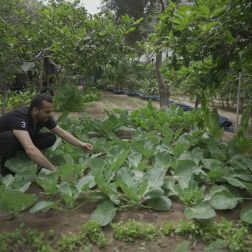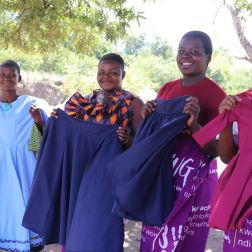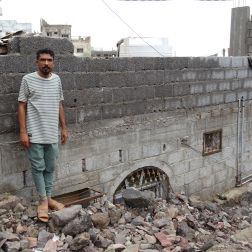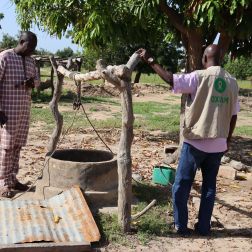- 4 mins read time
- Published: 18th April 2018
For those who have fled Eastern Ghouta, life now comes with different challenges
by Matthew Hemsley
An Oxfam staff member helps a child fill a water bottle from a tank in Herjalleh collective shelter. Oxfam has been trucking clean water to the site, for the 14,000 Syrians displaced from Eastern Ghouta who are living there. Photo Credit: Dania Kareh
Queueing from dawn until mid-afternoon for the chance of a hot meal, living eight people to a small tent, stagnant dirty water risking waterborne diseases as the temperature rises, and a shortage of clean water for washing, eating and cooking… These are just some of the issues raised with me by Syrians forced to flee eastern Ghouta, now living in a collective shelter in Herjalleh, rural Damascus - home to over 14,000 Syrians living either in rooms in small apartment blocks, other living outside the buildings in tents.
While the shelter is not as busy as it used to be, with relatives of some women and older men in the shelter able to sponsor them to leave, those running the humanitarian response worry that more families from Douma will soon arrive.
One official said, "there could be 20,000 more people coming and the sanitation is already overflowing, it needs to be fixed."
Living conditions are already crowded. For those living in apartment blocks, seven to eight sometimes must share a room. Parents and their children too. For people living in tents, it's harder. I spoke to one family of eight living in a small tent.
"When we moved here, we lived in the open. Now we have this tarpaulin sheet. We don't know how long we will have to stay here like this. Our homes in Ghouta were destroyed."
One family told me they left Ghouta with just the clothes on their backs. They previously kept sheep, but had to leave their livestock, and their livelihood, behind. They have no savings.
It's tough for people living out here, and what little money they do have - some offered by relatives trying to help - just doesn't stretch that far.
There are shops in the shelter, selling vegetables and other goods, but though the prices are cheaper than they were in Ghouta, it is difficult for people with so little to afford what they need.
Warm meals are available, but people must wait in line, sometimes for hours at a time, to get their fair share. This is their everyday life.
Maintaining good hygiene is another challenge. A poor drainage and sanitation system means there is dirty water across the shelter, which increases health risks for the people who live here as the days get hotter, and as clean water becomes scarcer. Safety is a concern as well, and for many a simple trip to the installed showers and toilet blocks is a dangerous endeavour during the night hours.
But humanitarian agencies are helping improve conditions for civilians. Oxfam is providing clean water by truck to the communal water tower, the kitchen, and directly into tanks serving the apartment blocks. Tap stands are connected to other water sources making clean water available to those who need it. Other agencies, including the UN, are helping too. But more funding is desperately needed. Repairing a sanitation network that is overflowing, for example, doesn't come cheap - but it is lifechanging for the those living here, as well as for the community living in the nearby town.
For many people now in Herjalleh, the future looks uncertain. Many say their homes in Ghouta have been destroyed, their livelihoods lost. They have nowhere to go and want to remain in the shelter where at least there is some access to goods and services. Others have no way of knowing what is it that they've lost. But most hope to return to their homes someday. Whether that is a possibility or not remains to be seen.




